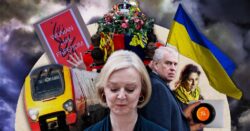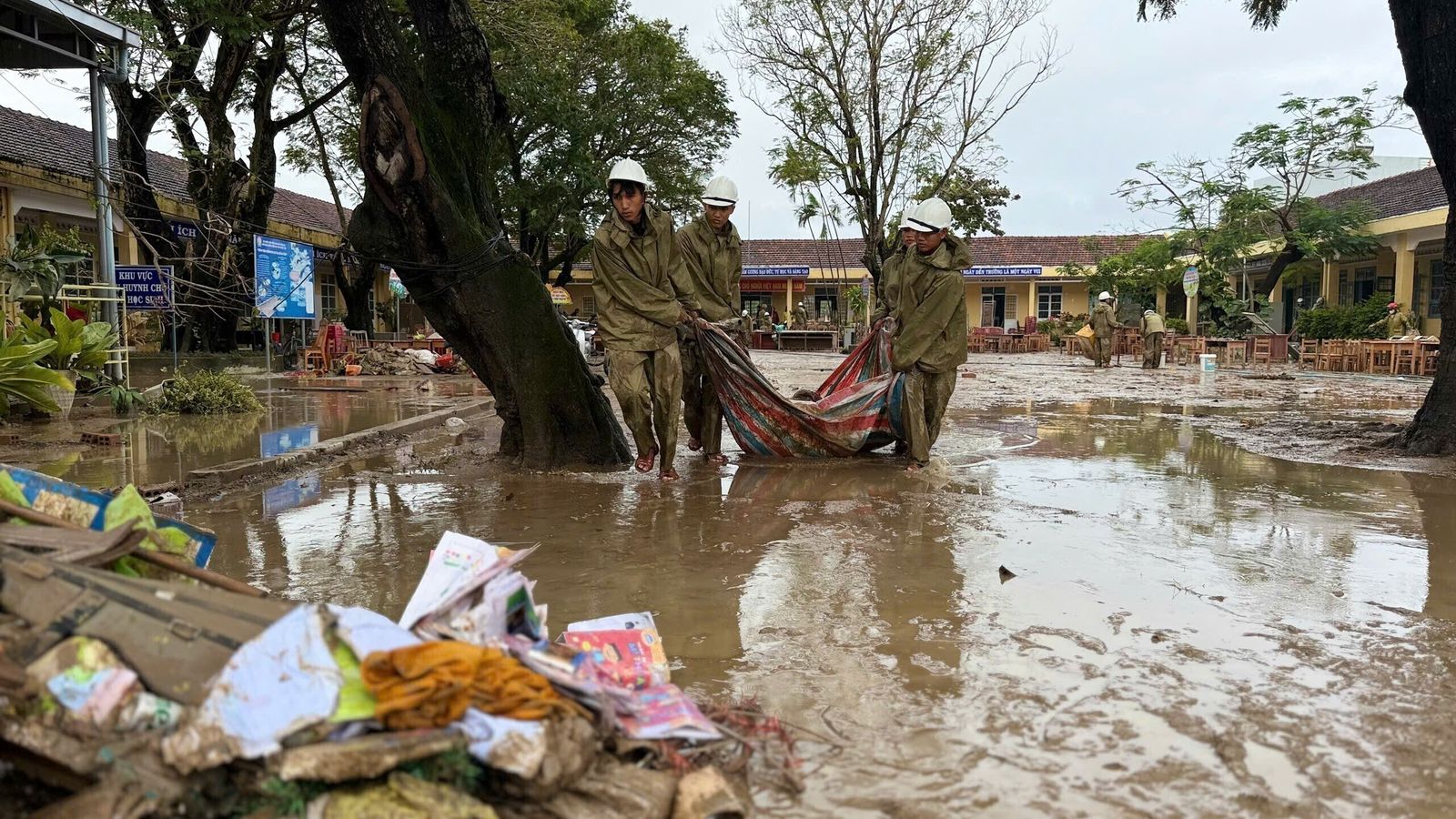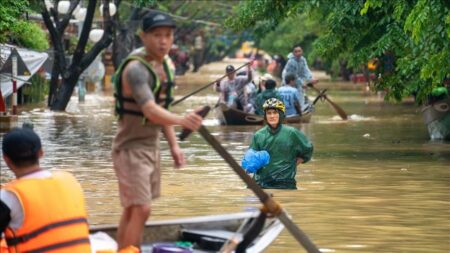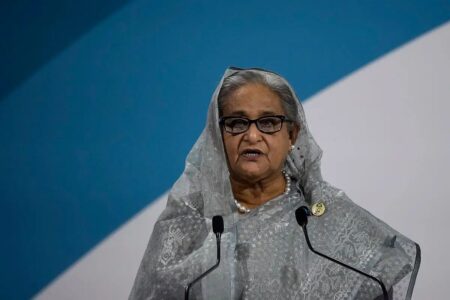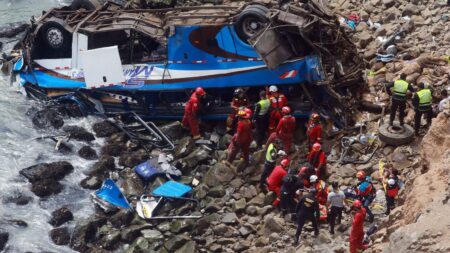This year has been quite a lot, to say the least (Picture: Metro Graphics/AP/Getty)
It felt it would never happen but at long last, 2022 is coming to an end.
For many, it’s easy to forgot some of the things that happened this year – or even a few days ago – as so much happened. Seriously, a lot.
From star-sized chorizo to the Russia-Ukraine war, 2022 had an endless supply of ‘unprecedented’ moments, ‘once in a lifetime’ events and a fair few ‘crises’.
So grab yourself a cup of tea (or a drink, we wouldn’t blame you) because Metro.co.uk is about to walk you through what was making the news in 2022 in the UK and beyond.
It has been a very, very long year
It’s go to start from somewhere? 2022 kicked off with then-prime minister Boris Johnson (ignore the ‘then’ for now, that’s a bit of a spoiler for what’s to come) ended the majority of the remaining Covid-19 restrictions.
Even though health officials stressed this is premature, the government binned mask-wearing orders and compulsory self-isolation.
A survey by the Office for National Statistics at the time found that 1.3 million Brits now live with long Covid.
On February 24, Russian president Vladimir Putin invaded Ukraine.
Though Putin initially expected to come on top, Kyiv fought back – hard – liberating massive swathes of land in the months-long tug-of-war.
Western allies have locked arms with Ukraine, sanctioning Moscow’s elite and handing Kyiv millions in aid.
The ongoing war has become a major flash point of 2022, shaking the foundations of the world, foreign policy, financial markets and the lives of millions fleeing Ukraine.
In February, Prince Andrew also reached a multimillion-pound out-of-court settlement with Virginia Giuffre.
The Duke of York was accused of abusing her three times when she was just 17 while she was the victim of a trafficking ring organised by billionaire paedophile Jeffry Epstein and his girlfriend Ghislaine Maxwell.
During the pandemic, Downing Street was quite the party hotspot, according to reports.
But in March, the Metropolitan Police issued the first wave of fines against people accused of breaching lockdown restrictions by attending the social gatherings.
After years of negotiations, appeals and hunger strikes, Nazanin Zahgari-Ratcliffe, a charity worker arrested and detained in Iran in 2016, finally came home. The British-Iranian was accused of ‘recruiting and training people to spread propaganda against Iran’.
In Sri Lanka, an army of farmers, lawyers, priests and more protested over political corruption and the bankrupt economy.
The civic movement eventually reached the doorstep of president Gotabaya Rajapaksa colossal mansion, leading to his ousting.
The year got a new main character in April when ‘tractor porn MP’ Neil Parish hit the headlines.
Parish, who represented Tiverton and Honiton, resigned after admitting to watching porn in the House of Commons.
The partygate scandal continued when Boris and Rishi Suank were slapped with fixed penalty notices. This made Johnson the first sitting prime minister to be sanctioned for law-breaking.
Further controversy pelted the government as ministers outlined plans to fly thousands of migrants who cross the English to Rwanda – the pact was condemned by the UN and countless human rights groups.
Ali Harbi Ali, a 26-year-old Islamic extremist, was found guilty of murdering Tory MP Sir David Amess on October 15, 2021. He was handed a rare whole life order.
Brits would get a break from the chaos of 2022 when the UK soared up to second place in Eurovision, losing to Ukraine in a massive show of international solidarity.
Outside of singing and dancing, the show that was partygate continued.
Sue Gray, a top senior servant, described in an explosive and highly-anticipated report how Downing Street’s office culture was marinated in alcohol throughout the pandemic.
Monkeypox, a rare viral infection since renamed Mpox, was detected by UK health officials for the first time in May.
Outbreaks in dozens of countries followed, disproportionally impacting the LGBTQ+ community. But vaccination programmes spearheaded by health officials and grassroots queer groups have curbed cases – though there’s still far to go.
Imran Ahmad Khan, a former Conservative MP, was sentenced to 18 months in jail for sexually assaulting a 15-year-old boy.
In a decision that shuddered fear and anger worldwide, the US Supreme Court revoked people’s five-decades-long constitutional right to abortion.
People weren’t happy. In the UK, protests erupted outside the US embassy while Johnson said it was a ‘big step backwards’.
The Platinum Jubilee – or as most knew it as, ‘platty jubes’ – marked 70 years of service by Queen Elizabeth II.
A major setpiece in Johnson’s downfall came when 1922 committee chair Sir Graham Brady announced a vote of confidence in the prime minister’s leadership – four in 10 MPs voted against him.
More political drama came when Scotland’s first minister, Nicola Sturgeon, outlined hopes for a second independence referendum – though, the High Court would dash them in November.
And one of the most gripping legal dramas came to an end – ‘Wagatha Christie’. Rebekah Vardy lost her libel case against Coleen Rooney, who accused the media personality of leaking ‘fake stories’ about her to the press in 2019.
Johnson, the scandal-scarred prime minister, resigned on July 7 following a wholesale rebellion of his cabinet and plummeting public support.
The reason? Among them, criticisms over his handling of Tory MP Chris Pincher who allegedly groped two men.
His resignation dragged the UK into something that the public was pretty much used to at this point – an unprecedented political crisis.
The Met Office, meanwhile, issued endless weather warnings as temperatures reached a nearly sweltering 40°C.
In far less controversial news, the Lionesses won England’s first major trophy since 1966 after winning the Euros in a nail-biting game against Germany.
Football, at long last, came home.
The summer was sunny and hot – but this combination wasn’t exactly dream holiday material.
From terrifying wildfires to the worst drought in 500 years, it felt like no country was safe from the devastating heat.
The impact of climate catastrophe was felt especially in Pakistan, where three months of flooding killed nearly 1,400 people and caused billions in damages to homes, crops and infrastructure.
Reminders of the fragility and wonder of life were laid bare by Nasa’s James Webb Space Telescope as well – though, scientists can confirm there are no star-sized chorizo slices in space as some briefly thought there were.
Queen Elizabeth, Britain’s longest-serving monarch who ruled for seven decades, died in Balmoral Castle on September 8.
Her eldest son, Charles, took over the throne as King Charles III, ushering a new chapter of British history that came with a mighty queue to match.
Only a day before, the Queen had met with the country’s new Conservative prime minister, Liz Truss, who beat Rishi Sunak to the punch.
And what a first month in office. Truss and her newly appointed chancellor, Kwasi Kwarteng, sent the pound plunging, bloated borrowing costs and lost countless people their homes as lenders withdrew loans because of their mini-budget.
Though, their plan to freeze energy bills was a relief to many.
But the UK wasn’t alone in turmoil. A wave of protests swept Iran following the death of Masha Amini, 22, in the custody of the so-called morality police.
The unrest has become one of the biggest challenges to Iran’s decades-long authoritarian clerical rule in living memory.
Oh, and a chess champion was accused of using computer assistance and anal beads to win. Yes, really.
First, it was Kwarteng to go. Then, after only 44 days in office, Truss left, making her the shortest-serving prime minister in UK history.
Following – you guessed it – another leadership contest, former chancellor Sunak stepped in to replace Truss.
He became leader of the UK at a time of growing labour unrest, with rail workers, among many other workers, in their tens of thousands striking over threadbare pay and working conditions.
Elon Musk, the world’s second richest person, closed his blockbuster purchase of Twitter – and we all know how well that ended up going for him.
From social media to soup. Two Just Stop Oil activists took action against oil extraction in the UK by lobbing cans of tomato soup at Vincent van Gogh’s Sunflowers.
The cost of living crisis had been gnawing at people’s budgets for what felt like an eternity.
But with inflation swelling to 14.1% in November, the pain was especially pronounced as anxiety levels rose with winter fast approaching.
The ways Brits are getting by have been haunting. Eating pet food as they can’t afford groceries, relying on ‘baby banks’ and turning to fundraising websites to survive.
Former health secretary Matt Hancock was also in the news for reasons that would, frankly, be incomprehensible to anyone a decade ago.
But this is the 2020s where nothing makes sense anymore; Hancock joined I’m a Celebrity Get Me Out Of Here. You know, the one where contestants eat kangaroo penis (Hancock would do just that, by the way).
Though the Tory party gave him the boot for it, Hancock ended up finishing third place in the ITV show.
The FIFA World Cup – yes, there’s even more that happened in November – took place in Qatar, the first time the football tournament took place in the Middle East. But it wasn’t without controversy, with criticism over the gulf nation’s treatment of LGBTQ+ people, women and migrants simmering.
In a rare display of public upheaval, people in China protested in cities up and down the country over, among other things, the stringent, years-long ‘zero Covid’ measures’. The policies would be softened the following month.
COP27, a major UN climate conference, ended with a historical move to provide financial support to nations most vulnerable to the brutal impact of climate change.
Prince Harry and Meghan Markle dropped a Netflix docu-series to end the year in a pretty explosive way.
In one of the most anticipated TV spectacles of the year, Harry & Meghan saw the couple open up about how they fell in love, the media battering that followed and how their public break with the Royal Family happened.
NHS nurses, as well as other healthcare workers, for the first time in history walked out over years of stalled pay and detorieating working conditions – and more strikes are expected in the new year.
British officials would sound the alarm over about Strep A, a common bacteria that causes mild illnesses like strep throat and more deadly ones.
At least 30 children have died in the UK of complications caused by Strep A.
A cold snap in Britain would lead to the country being blanketed in snow, ice and, well, slush.
Thousands were left without power as the blast of Arctic air swept the nation. In a case that touched off a wave of grief, three young children died after falling through the ice of a Solihull lake.
And in the grand finale of 2022, Andrew Tate was detained in Romania as part of a rape and human trafficking investigation hours after his online spat with Greta Thunbrerg.
House Democrats ensured the year wouldn’t end on a quiet note by managing to wriggle Donald Trump’s tax returns that stretch from 2015 to 2020 out of the former president’s grip.
A lot happened, to say the least.

